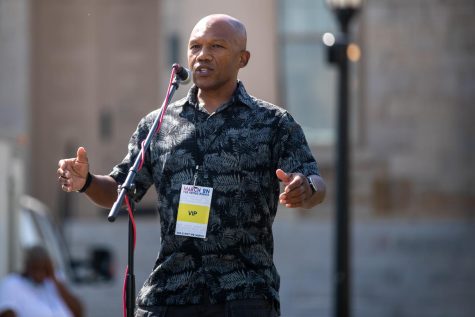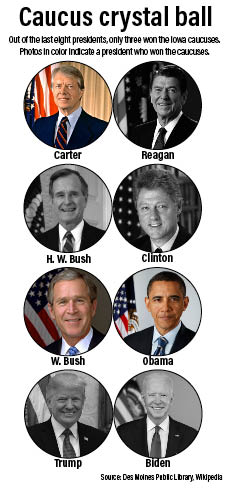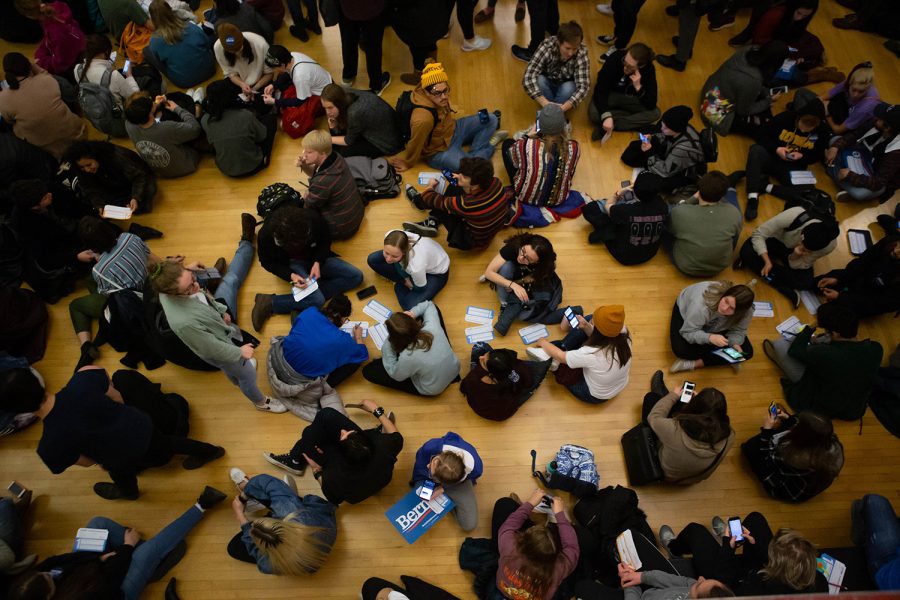Iowa caucuses in jeopardy despite efforts from Iowa politicos
Iowa may be in danger of losing its first-in-the-nation status after the DNC’s Bylaws and Rules Committee drafted a proposal to reinvigorate the Caucus system.
University of Iowa students caucus at the Iowa Memorial Union on Monday, February 3, 2020.
April 10, 2022
In the midst of discussions between national Democratic leaders to scrap the Iowa caucuses, Iowa’s Democratic party leaders are determined to make the process more accessible in order to keep the state’s first-in-the-nation status.
Iowa Democratic Party Chair Ross Wilburn, also a state representative from Ames, said in an email to The Daily Iowan that he looks forward to working with the national committee to explore possible changes that could make the caucuses more straightforward and accessible.
“I will always fight for Iowa to remain first. I also understand that the DNC has its own procedural framework that will guide that discussion,” Wilburn said.

With a goal of making the presidential caucus process more transparent and accessible, the Democratic National Convention is drafting a proposal to make changes to the presidential election process — possibly sacrificing Iowa’s first-in-the-nation caucus status.
According to DNC documents originally reported by The Des Moines Register, Democratic leaders are drafting rules that will favor primaries over caucuses in a way to highlight diversity.
The documents say that over the course of recent committee meetings, members raised support for reviewing the nominating process because of concerns about diverse representation, election competitiveness, and a transparent process.
Essentially, states will be required to apply to hold their nominating contests — their caucuses or primaries — before the rest of the country. The four leading states, Iowa, New Hampshire, Nevada, and South Carolina may have to give up their spots if another state is considered.
David Redlawsk, a political science professor at University of Delaware and former Johnson County Democratic Party Chair, said that threats to scrap Iowa’s first-in-the-nation status in the past have never been very serious, but now the threats are real.
In the past, Redlawsk said, the complication fell onto deciding which state would be first instead. That is where the DNC’s proposal comes into play.
Why Iowa, anyway?
Redlawsk said a benefit to having the caucuses in Iowa first is that national media and the nation as a whole brings their attention to the state.
Iowa offers Democratic and Republican candidates an affordable campaign early in the process, Redlawsk says, and this helps to make sure more voices and ideas are heard before people begin to drop out of the race.
“In bigger states, it becomes too expensive to run, so if you don’t have the money to start with, or the attention to start with, it’s really hard to get started. A smaller state like Iowa, it’s possible even when you’re not well known at the beginning to get into the race,” Redlawsk said.
Iowa garnered its caucus status in 1972 because of a historical accident, Redlawsk said. After the Democratic party changed its rules between 1968 and 1972, Iowa happened to be pushed ahead of New Hampshire. He said the leaders decided to keep it there because nobody could decide on what to do.
Ed Cranston, the Johnson County Democratic Party Chair, said having so many candidates come to Iowa helps them to better understand rural issues. He said both Republican and Democratic candidates benefit from meeting Iowans to help bring these issues to the national scale.
Cranston said the Iowa caucuses help to test a campaign because it nearly forces them
to go out and meet people. This, in turn, allows local political groups to work with them and build communication.
“They can’t just do it all by the media. So with that, it just makes for stronger candidates,” Cranston said.

Regardless of whether the Democratic party scraps the caucuses, the Republican party, which hasn’t raised the same concerns about diversity and accessibility, will likely keep them for the time being.
Sen. Chuck Grassley, R-Iowa, said that some presidents, namely Presidents Barack Obama and Jimmy Carter, would not have won the presidency without winning the Iowa caucuses first. He said that back in 2008, Obama had to prove to the Democratic party that an African American man could win the presidency — and he proved that by winning Iowa.
“I think that was a big thing. If he couldn’t prove that he could be the president of the United States, Iowa being first in the nation gave him that opportunity to prove that,” Grassley said.
Rep. Mariannette Miller-Meeks, R-Iowa, said Republicans trust Iowans and value the services they do in vetting candidates.
“Since I’m an ophthalmologist, it is ‘short sighted’ for the Democrats to get rid of Iowa’s first in the nation status,” Miller-Meeks said.
Miller-Meeks said there are very few other states that invest in getting to know candidates the way that Iowa does. Through looking at their records, life history, and life experiences, Iowans help the rest of the country decide who should be president.
In the years since Iowa has been situated as the first caucus, three presidents who won the caucus in Iowa have gone on to win the presidency — Jimmy Carter, Barack Obama, and George W Bush.
Ronald Reagan, George H.W. Bush, Bill Clinton, Donald Trump, and Joe Biden failed to win the Iowa Caucus but still went on to win the presidency.
If not Iowa, then where?
Iowa has maintained its status because the DNC hasn’t been able to solve the issue of who would replace it in the presidential process.
Now, as the party moves towards diversity and inclusion as a major platform goal, applicant states who want to be waived to hold their caucuses early will be analyzed for their ethnic, geographic, and union representation alongside their election competitiveness.
The DNC documents say the Rules and Bylaws Committee seeks to provide a 2024 presidential calendar that will also put Democrats in the best position to win up and down the ballot.
According to the Des Moines Register, with Iowa’s population standing at over 90% white and as the state sways away from its classification as a swing state, the DNC is looking for alternatives.
Redlawsk’s solution for the national party is for all four starter states — Iowa, New Hampshire, Nevada, and South Carolina — to hold their caucuses and primaries on the same day.
Having all four states go first helps to better represent the country as a whole, Redlawsk said, while not ignoring smaller states that the Democratic party is trying to win back.
“I think it’s manageable. It still focuses on smaller states so that even candidates who are not well known have a chance to get started,” Redlawsk said. ”And it recognizes the history in Iowa and New Hampshire’s positions in the process. That has some value.”
Ultimately, Redlawsk said, many Democratic activists are losing confidence in the caucus process.
The way the caucuses are engineered makes it difficult for many Americans to participate, he said. Whether it be the time commitment or another obstacle, Democrats are looking to a primary-style process.
“I also recognize the problem these days of requiring people to show up at a certain place at a certain time, that does reduce turnout. And that’s probably not a good thing,” Redlawsk said.
Cranston said that the caucus process could, in fact, be improved and that there is a willingness in the party to make any necessary changes.
Johnson County Republican Party Chair Karen Fesler said that if Iowa loses its first-in-the-nation status, the state won’t see nearly as much political action. At best, she said, campaigns would run their ads but would not come to meet Iowans.
Fesler said Iowa Republicans have worked hard to show the Republican National Committee how important the first-in-the-nation status is, not just for Iowa, but for the party and country as a whole.
“I think that Iowa has done a very good job with it. I’m hoping that Democrats will reconsider and think about what they’re doing and maybe try to figure out a way to meet some of the criteria they would like to meet,” Fesler said.



